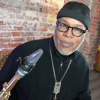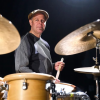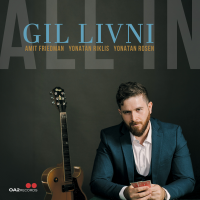Home » Jazz Articles » Interview » Greg Osby: Q & A
Greg Osby: Q & A
...too many musicians stick in the comfort zone of their own age group--their peers. But I try and find young talent and cultivate it ? lend my expertise and get them pointed in the right direction.
 Saxophonist Greg Osby is a musician who doesn't believe in standing still. Born in St. Louis in 1960, Osby became one of the founders of the influential, innovative M-Base musical collective in New York City in the late 1980s. Osby has also produced one of the most interesting,diverse series of recordings in jazz over the past 15 years ' most of it released on the prestigious Blue Note label. Now in his early forties, Osby continues to challenge the musical status quo while also serving as a valuable role model and resource for talented younger musicians. In the following interview, conducted in Jnauary, Osby discusses his development as a musician — from St. Louis and M-Base to his eclectic Blue Note recordings ' and overviews his current working band and what lies on his musical horizon.
Saxophonist Greg Osby is a musician who doesn't believe in standing still. Born in St. Louis in 1960, Osby became one of the founders of the influential, innovative M-Base musical collective in New York City in the late 1980s. Osby has also produced one of the most interesting,diverse series of recordings in jazz over the past 15 years ' most of it released on the prestigious Blue Note label. Now in his early forties, Osby continues to challenge the musical status quo while also serving as a valuable role model and resource for talented younger musicians. In the following interview, conducted in Jnauary, Osby discusses his development as a musician — from St. Louis and M-Base to his eclectic Blue Note recordings ' and overviews his current working band and what lies on his musical horizon. All About Jazz: You were born and raised in St. Louis. When did you first get into jazz?
Greg Osby: Actually, I didn't really get into jazz until I went to college. I had been playing music since junior high school when I started on the clarinet. I played that because I wanted to be in the band and it was a choice between that and the trombone. I switched to alto sax in high school at Soldan, and I took music seriously. I was playing in a lot of local bands, but the music was funk, R&B, top 40 situations. So I didn't really play much jazz until I went to Howard University on a scholarship. But even there, the emphasis was on classical music. Their jazz department was very new and embryonic back then.
AAJ: From Howard you transferred to the Berklee School of Music in Boston, right?
GO: Yeah. I was a young maverick ' arrogant and more interested in ladies than music. But the second year at Howard I visited Berklee on spring break. A friend of mine, Chad Johnson, said I had to come and check it out. I sat in on some classes and was impressed by the teaching method. Students brought their instruments to class and actually performed each other's compositions and then critiqued each other. I ended up sitting in with ensembles, and some of the teachers wrote me letters of recommendation, so I got a scholarship to go there and jumped ship at Howard
AAJ: It wasn't long before you began checking out the New York City jazz scene, right?
GO: During the middle of my second year at Berklee, a lot of the cats started to drop out of school, get good gigs in New York and come back with impressive suits and tales of their worldly travels. That was very frustrating for me ' that's exactly what I wanted to do. I was still very into majoring in jazz composition and arranging, but I started making regular pilgrimages to new York ' saving my pennies and sitting in with musicians at various clubs. You could do that then ' it's more difficult now. A year after that Jon Faddis grew tired of the studio scene and began searching for a band, and my name evidently kept coming up. So he flew my down, I went right from the taxi into a studio to cut a demo, and his manager called me a week later to hire me. So even though I only had a couple of months until graduation at Berklee, I picked up and went. But almost right away, Faddis started to have some personal difficulties, and he put the band on the back burner ' much to my dismay. I was living in an apartment with four other people and I didn't have a gig. I had to get the dreaded day job.
AAJ: So what were you doing ' and how did things work out?
GO: I did all kinds of ridiculous things ' worked on a loading dock, at a cleaning service, doing remodeling and demolition work outside in the bitter cold in January. But I kept sitting in at clubs at night ' basically I didn't sleep. Luckily I picked up a few sideman gigs ' mainly with salsa bands. A lot of times I was the only person in the club who spoke English, but it opened me up to a lot of musical possibilities. Eventually I started working gigs with Woody Shaw, Lester Bowie, David Murray ' then Faddis regrouped his band. But it was frustrating, because by then I really was coming out of the closet with my own musical approach to composition and improvisation. And I ended up turning down a gig with Art Blakey because of that as well. I really wanted to work on my own thing ' my own sound. And about six months later, Jack DeJohnette gave me a call after hearing a tape of me and it was a golden opportunity.
AAJ: That was DeJohnette's Special Edition band he put together in 1987 with sax and flautist Gary Thomas, who was a friend of yours at Howard.
GO: Yeah, I've known Gary since 1978. He was a great friend ' along with Steve Coleman, whom I had met when I first came to New York. At the same time I was working with Jack, Steve and I were working on putting together what would become M-Base.
AAJ: M-Base turned out to be a real springboard for a lot of young musicians. Didn't it?
GO: It all started when Steve and I and other musicians would just get together and talk about what a stressful situation it was to try and work in New York. Here it was supposed to be the Mecca of the arts, and nobody really talked about music. Whenever I would ask someone to get together to play and exchange information, it seemed like they would say something like, 'Well, I don't know man. I'm just working on some things I'm hearing in my head,' then turn around and talk to some young lady. I thought that was really out ' preferring to do their thing rather than furthering the music. So around 1984, Steve and I decided to just call a lot of cats and ask them about their personal approach to music, record the conversations and type 'em up. We ended up with a lot of interesting concepts that were inspiring, but when we asked these musicians why they didn't play like that on gigs, they would say they couldn't play that way ' they had to play what they thought record labels were looking for. The scene was basically dictated by the industry instead of the musicians ' which was the reverse of the way it was it the old days. Even when the industry took over and pushed swing, the musicians got together and conspired to change the scene and play bop. So that's the approach we decided to take ' and had a mass call-to-arms.
AAJ: It seemed to work ' at least for the core group that became M-Base.
GO: Yeah, a lot of people dropped out quickly, but those who stuck around started to get together and write tunes and play them as a group and talk about new concepts ' writing using different meters, different harmonic structures and progressions, incorporating elements of other styles. Finally we gave it the name M-Base so people would know what we were referring to. It was a catchy acronym. The music industry didn't take us seriously, but we started putting together recordings and shopping 'em to labels and getting some press coverage. So through perseverance, things began to change. It became a pool of like-minded musicians who were all willing to contribute their talents to each other's projects. Myself, Steve, Gary, Geri Allen, Robin Eubanks, Cassandra Wilson and a bunch of others were into it.
AAJ: Is M-Base still active?
GO: Steve is still pretty active in it, and there's still a Web site. But over the years, as many of the people in it became leaders of their own groups, it's been more difficult to get together ' except in smaller groups and one-on-ones. Back then, most of us lived within earshot of each other in the same neighborhood in Brooklyn. But I still hear shards of the M-Base influence in everyone's music. And wherever I go around the earth ' Germany, Japan, Turkey ' I hear musicians who have taken our recordings, transcribed things and analyzed them and are using those same processes in their own compositions.
AAJ: You've been recording for Blue Note for a dozen years, and the relationship seems to be still going strong.
GO: It's been great, because Bruce Lundvall, who heads up the label, lets me go in the musical directions I want to go. And he's defended me and kept me on the label when others more concerned with the bottom line have pushed to get rid of me. And I think it's a relationship that has paid off for both of us over the years.
AAJ: You've become something of a mentor to younger musicians over the past few years, bringing young, talented musicians into your band and helping them develop ' guys like Jason Moran.
GO: Yeah, too many musicians stick in the comfort zone of their own age group ' their peers. But I try and find young talent and cultivate it ' lend my expertise and get them pointed in the right direction. We really need that mentorship, that hands-on approach. And finding young musicians is an on-going process. This current tour will be the last few dates for Jason with the group ' he's gotten such notoriety and has so much activity with his own group. He's been in my group for six years, and it's time. You have to let people go. I was lucky to get him when he was a complete unknown ' now it's time to test the waters with another new group of unknowns.
AAJ: You have a couple of other new musicians in the band on this tour as well, don't you?
GO: Yes, Damion Reid on drums from Los Angeles, and Matt Brewer on bass. They're both in their early 20s. It's a changing of the guard. On this tour I'll be giving them a bit of rope ' not enough so they hang themselves but enough to hopefully wield their talent and develop and have a gainful run in the group. And I'll be out scouting for a pianist after this tour.
AAJ: How do you go about finding musicians for your group?
GO: I get recommendations from musicians I respect and people send me CDs. Then I go check out these guys anonymously ' sitting in the back of the club ' and see what they can do. I've made mistakes and hired great musicians sight unseen who didn't fit into what I do. Musically, I'm unorthodox, and I also have my own value system that has to be addressed, discussed and understood in order for people to flourish within the parameters of the music. There have been various train wrecks over the years, so now I know better ' I get with people before and counsel them.
AAJ: Actually, you hired Jason Moran without hearing him play, didn't you?
GO: That's true, but he actually fits my hiring approach, because although I hired him without hearing him, he came highly recommended by my drummer at the time, Eric Harland. And Jason and I had a marathon telephone conversation, and by his references to pianists like Fats Waller, Art Tatum, Herbie Nichols, Andrew Hill, Duke Ellington, Jaki Byard, instead of the usual 'big three' people in his age group ' McCoy Tyner, Chick Corea, Keith Jarrett. I thought if he's one-hundredth as good as the game he's talking, everything will be fine. I took him out on a two-month tour, heard him play for the first time on stage in Vienna, Austria, and was blown away.
AAJ: What new projects are you working on?
GO: I'm in the studio at the end of January recording a new album. It's going to be unusual for me, because there won't be any of my own compositions on it. I'm going to do rearrangements of tunes with St. Louis themes ' St. Louis Blues,' 'East St. Louis Toodle-oo,' things from the 1920s and '30s. It will be evocative of that era, but with a different spin ' a sound that's very, very contemporary. Since we'll be fresh from the studio, we'll probably play some of that material on this tour.
Related Article
1999 AAJ Interview with Greg Osby
Tags
PREVIOUS / NEXT
Greg Osby Concerts
Support All About Jazz
 All About Jazz has been a pillar of jazz since 1995, championing it as an art form and, more importantly, supporting the musicians who make it. Our enduring commitment has made "AAJ" one of the most culturally important websites of its kind, read by hundreds of thousands of fans, musicians and industry figures every month.
All About Jazz has been a pillar of jazz since 1995, championing it as an art form and, more importantly, supporting the musicians who make it. Our enduring commitment has made "AAJ" one of the most culturally important websites of its kind, read by hundreds of thousands of fans, musicians and industry figures every month.

























